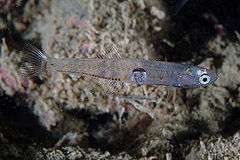Transparent goby
Aphia minuta, the transparent goby, is a species of the goby native to the northeastern Atlantic Ocean where it can be found from Trondheim, Norway to Morocco. It is also found in the Mediterranean, Black Sea and the Sea of Azov. It is a pelagic species, inhabiting inshore waters and estuaries. It can be found at depths of from the surface to 97 metres (318 ft), though it is usually found at 5 to 80 metres (16 to 262 ft), over sandy and muddy bottoms and also in eelgrass beds. This species can reach a length of 7.9 centimetres (3.1 in) TL. It is an important species to local commercial fisheries. It is currently the only known member of its genus.[1]
| Transparent goby | |
|---|---|
 | |
| Scientific classification | |
| Kingdom: | Animalia |
| Phylum: | Chordata |
| Class: | Actinopterygii |
| Order: | Gobiiformes |
| Family: | Gobiidae |
| Genus: | Aphia Risso, 1827 |
| Species: | A. minuta |
| Binomial name | |
| Aphia minuta (A. Risso, 1810) | |
| Synonyms | |
|
(for the genus)
(for the species)
| |
Gastronomy
This fish is appreciated in Spain as part of the Andalusian, Catalan and Valencian cuisines,[2] and in Italy as part of the Italian cuisine.[3] In Andalusia where they are called chanquetes, they are traditionally served deep-fried, with fried eggs and roasted or fried bell pepper.[4] Due to their relatively high price, they are often replaced by some species of East Asian noodlefishes, locally called chanquete chino (Chinese chanquete), Neosalanx tangkahkeii and Protosalanx.[5][6] This replacement is often done openly, but sometimes it is done fraudulently.[6]
References
- Froese, Rainer and Pauly, Daniel, eds. (2013). "Aphia minuta" in FishBase. April 2013 version.
- "Chanquete". Euroresidentes.com. Retrieved 2014-08-17.
- "Rossetti". facarospauls.com. Retrieved 2019-03-09.
- "Chanquetes fritos con pimientos, cebolla y huevo frito". Mis-recetas.org. Retrieved 2014-08-17.
- "East China Seas Holdings Corporation Ltd. - ECS". Eastchinaseas.com. Retrieved 2014-08-17.
- Armani, A.; Castigliego, L.; Tinacci, L.; Gianfaldoni, D.; Guidi, A. (2011). "Molecular characterization of icefish, (Salangidae family), using direct sequencing of mitochondrial cytochrome b gene". Food Control. 22 (6): 888–895. doi:10.1016/j.foodcont.2010.11.020.
External links